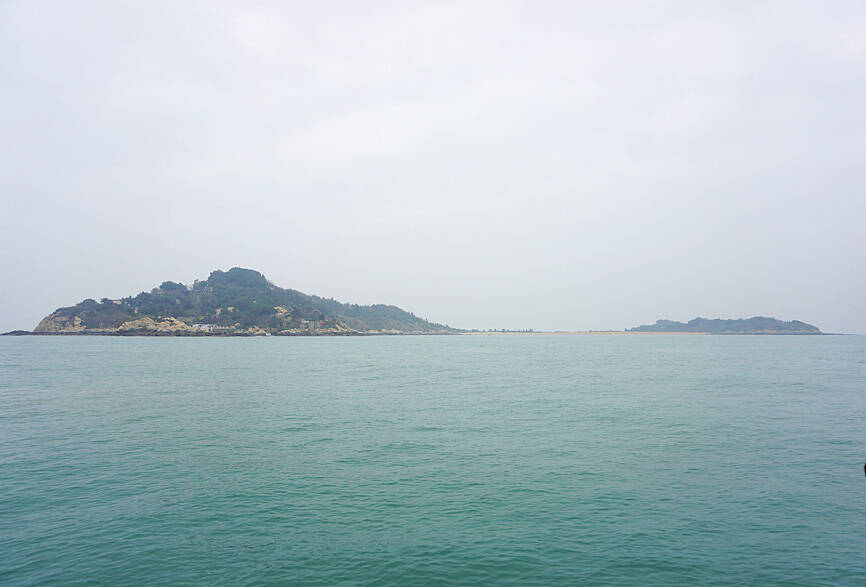The Ministry of National Defense is to be applauded after personnel at its Kinmen Defense Command fired shots to chase away Chinese commercial drones, Democratic Progressive Party (DPP) lawmakers said yesterday, adding that the ministry must establish standard operation procedures for such events.
Previously, troops had only fired warning flares in response to such incursions and refrained from more aggressive countermeasures, such as shooting the drones down, to avoid further escalating cross-strait tensions.
The Kinmen command said in a statement on Tuesday evening that soldiers stationed on three islets — Dadan (大膽), Erdan (二膽) and Shiyu (獅嶼) — each detected a Chinese commercial drone flying in restricted areas near their respective outposts at about 4:23pm.

Photo: CNA
In accordance with its four-step rules of engagement for drone encounters — “firing warning flares, reporting the incursion, expelling the drone and ultimately shooting it down” — the command said that soldiers first fired warning flares near the drones.
As the drones continued to hover, shots with live ammunition were fired to expel them, the command said, adding that they flew toward Xiamen on the Chinese coast about 5km away.
A similar incident occurred at about 5:59pm on Erdan Islet, the command said, adding that a single drone flew back to Xiamen a minute after troops fired shots at it.
The command provided no details on how many shots were fired or the kind of weapons used.
The information on Taiwanese troops firing shots at Chinese drones was released hours after President Tsai Ing-wen (蔡英文) early on Tuesday said that she had instructed the armed forces to take “strong countermeasures” when necessary to protect Taiwan’s airspace.
Taiwan’s military has come under heavy criticism for its apparent lack of a serious response to Chinese drone incursions in the airspace of Taiwan’s outlying islands.
Videos have been posted online of military facilities in Kinmen County that were apparently recorded by commercial drones.
DPP Legislator Hsu Chih-chieh (許智傑) yesterday said that incursions into Taiwan’s airspace by Chinese drones cannot be tolerated and thanked the ministry.
Taiwan’s military should respond appropriately, guided by the principle of self-defense, Hsu said.
The ministry should establish a response procedure for soldiers in such situations, he said.
DPP Legislator Chen Ting-fei (陳亭妃) said that a response procedure would allow the defense forces in Kinmen to call in equipment that could hamper or drive off drones instead of just broadcasting warning messages.
“The ministry should adopt a tougher stance on handling Chinese drone incursions,” Chen said.
Chinese Nationalist Party (KMT) Legislator Johnny Chiang (江啟臣) said that it was past due for the military to provide a “suitable reaction.”
The Vital Area Regulations (要塞堡壘地帶法) restrict access to military-controlled zones and their air space are no-fly zones, Chiang said.
Any aerial vehicle from any nation should be shot at or shot down if they ignore warnings, he said.

SECURITY: As China is ‘reshaping’ Hong Kong’s population, Taiwan must raise the eligibility threshold for applications from Hong Kongers, Chiu Chui-cheng said When Hong Kong and Macau citizens apply for residency in Taiwan, it would be under a new category that includes a “national security observation period,” Mainland Affairs Council (MAC) Minister Chiu Chui-cheng (邱垂正) said yesterday. President William Lai (賴清德) on March 13 announced 17 strategies to counter China’s aggression toward Taiwan, including incorporating national security considerations into the review process for residency applications from Hong Kong and Macau citizens. The situation in Hong Kong is constantly changing, Chiu said to media yesterday on the sidelines of the Taipei Technology Run hosted by the Taipei Neihu Technology Park Development Association. With

CARROT AND STICK: While unrelenting in its military threats, China attracted nearly 40,000 Taiwanese to over 400 business events last year Nearly 40,000 Taiwanese last year joined industry events in China, such as conferences and trade fairs, supported by the Chinese government, a study showed yesterday, as Beijing ramps up a charm offensive toward Taipei alongside military pressure. China has long taken a carrot-and-stick approach to Taiwan, threatening it with the prospect of military action while reaching out to those it believes are amenable to Beijing’s point of view. Taiwanese security officials are wary of what they see as Beijing’s influence campaigns to sway public opinion after Taipei and Beijing gradually resumed travel links halted by the COVID-19 pandemic, but the scale of

A US Marine Corps regiment equipped with Naval Strike Missiles (NSM) is set to participate in the upcoming Balikatan 25 exercise in the Luzon Strait, marking the system’s first-ever deployment in the Philippines. US and Philippine officials have separately confirmed that the Navy Marine Expeditionary Ship Interdiction System (NMESIS) — the mobile launch platform for the Naval Strike Missile — would take part in the joint exercise. The missiles are being deployed to “a strategic first island chain chokepoint” in the waters between Taiwan proper and the Philippines, US-based Naval News reported. “The Luzon Strait and Bashi Channel represent a critical access

Pope Francis is be laid to rest on Saturday after lying in state for three days in St Peter’s Basilica, where the faithful are expected to flock to pay their respects to history’s first Latin American pontiff. The cardinals met yesterday in the Vatican’s synod hall to chart the next steps before a conclave begins to choose Francis’ successor, as condolences poured in from around the world. According to current norms, the conclave must begin between May 5 and 10. The cardinals set the funeral for Saturday at 10am in St Peter’s Square, to be celebrated by the dean of the College